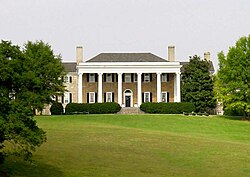 |
| Carter Hall, Millwood (Jackson and his troops camped on grounds) |
HEADQUARTERS DEPARTMENT OF NORTHERN VIRGINIA, November 6, 1862.
Lieutenant General THOMAS J. JACKSON,
Commanding Corps:
GENERAL: Your letter* of yesterday from Millwood has been received. The progress of the enemy so far seems to be steadily forward, judging from your reports and those of General Stuart, occupying in his advance the gaps of the Blue Ridge with his right and resting his left on the Orange and Alexandria Railroad. It would seem to be his desire either to detain you in the valley or to get above you, so as to cut you off from a junction with Longstreet, neither of which must you permit. It will be necessary for you to make every arrangement, so that you may move promptly up the valley, that the two corps can be kept in communication with each other and unite when necessary. General George H. Steuart will have to evacuate Winchester before you move higher than Front Royal, and I hope you will be able to bring off all the sick that are able to travel. One of the objects of the enemy in proceeding through the counties bordering on the Blue Ridge may be to obtain the forage in that region. You must give the necessary directions to Munford, so that he may regulate his movements by your own. The advantage of the enemy on the eastern slope of the Blue Ridge may be regulated by his force and his facilities for procuring supplies of forage and provision. I do not think he would descend into the valley except with such force as he would think capable of crushing you, still leaving a sufficient force to oppose Longstreet. I have directed Stuart to watch his movements closely, and inform me when he occupies Chester Gap or advances toward Thornton's. In the latter event it will be unwise for the whole of the cavalry to fall back before him to Luray, as that would leave exposed the whole of the country east of the Blue Ridge. I will make inquiries about signal men, and endeavor to establish a line so far as our means will permit. I have heard, however, that one of our signal officers was captured in Loudoun.
Colonel Corley has gone this morning to Staunton to see about blankets and shoes. I hope he will be able to give you a supply. You must keep me advised of your position and of the movements of the enemy against you. I request that will have your divisions as much united as possible, so that you may fall upon any one of the enemy's columns which may expose itself should the opportunity occur to crush it, and that you will endeavor to lead the enemy forward for the purpose.
You did right in sending the shoemakers to Staunton, and I hope that you placed Colonel Davidson on his guard, lest they should turn traitors.
Very respectfully, your obedient servant,
R. E. LEE,
General.
*Not found.
Official Records, Series I., Vol. 19, Part 2, Page 697.
Lee neatly summarizes the key to the early stages of the Fredericksburg campaign, the importance of the Union Army moving so as to interpose between Longstreet and Jackson. Ever aggressive, Lee also encourages Jackson to look for opportunities to overwhelm any fragments of the Union army advancing in his direction. Also noted, and important, is the need for both armies to find forage. Although Lincoln has sent orders to relieve McClellan they have not arrived and Lee is unaware of the change in command for the simple reason McClellan himself does not yet know.
No comments:
Post a Comment